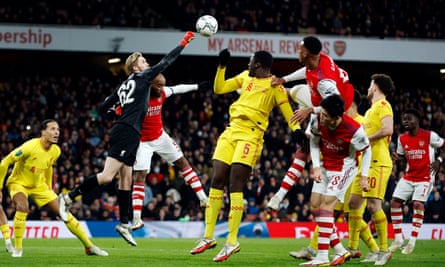To become a “true legend” at Liverpool, Pepijn Lijnders had claimed on the eve of the rearranged Carabao Cup semi-final, “you need to go for the national cups as well.” Jürgen Klopp’s assistant was not downplaying past glories but talking up the future of a Liverpool team that has evolved to the extent he expected it to punish Arsenal even without the cutting edge of Mohamed Salah and Sadio Mané. Lijnders was talking of Liverpool’s hunger too, and it appeared he had written the script.
A 2022 Carabao Cup winner’s medal will not define the Liverpool legacy of Trent Alexander-Arnold, Virgil van Dijk, Jordan Henderson or any other player who ended the club’s 30-year wait for a Premier League title and delivered a sixth European Cup to Anfield. But this Liverpool team should have more honours to its name. Six years without a Wembley appearance is too long for a squad of such talent. The desire to correct both flowed through a commanding victory at the Emirates Stadium where the experience in Klopp’s side toyed and tormented the youth of Arsenal. Their celebrations at Anfield a week ago did indeed prove premature.
This was Diogo Jota’s night, aided and abetted by two more assists from the laser-guided right foot of Alexander-Arnold. The striker has cause to create his own legend. The Portugal international did not taste Premier League or Champions League success with Liverpool – Chelsea at Wembley next month will be his first opportunity to claim silverware with Klopp’s team. Salah and Mané will both have returned from the Africa Cup of Nations by then.
His two accomplished goals, plus the penalty that sealed the shoot-out victory over Leicester in the quarter-finals, present a formidable argument for his inclusion among a wealth of world-class options. Jota’s second goal in particular underlined his progress at Anfield. Collecting Alexander-Arnold’s pinpoint delivery on his chest before lobbing the advancing Aaron Ramsdale, it was a finish so good that even VAR could not spoil the moment. Klopp’s full-blooded reaction to the eventual awarding of the goal confirmed how much a place at Wembley meant.
Klopp’s team selections, and insistence on playing the kids in an FA Cup replay against Shrewsbury in 2020 while he preserved the first team’s winter break, have forged the impression of a manager with little regard for domestic cup competitions. At times, his protestations to the contrary have sounded hollow but closer inspection of his record in the League Cup does offer mitigation.
Having reached the final in his debut season as Liverpool manager, where defeat came in a penalty shoot-out against Manchester City, Klopp reached the semi-finals in his first full season in charge. Southampton’s victory over two legs remains his only semi-final loss in 11 attempts. So not a shabby start. Subsequent early exits arrived away at Leicester, at home to an Eden Hazard-inspired Chelsea, against Aston Villa with an academy side while everyone else was in Qatar for the Club World Cup, and to Arsenal in a penalty shoot-out. The calibre of opposition and demands upon a Champions League-winner should also be taken into account when assessing Klopp’s approach to the League Cup.

His determination to reach Wembley on 27 February was again evident from the lineup against Arsenal, his satisfaction clear in his post-match jubilation. With the exception of Caoimhin Kelleher for Alisson and arguably Kaide Gordon for Takumi Minamino, Liverpool fielded their strongest available side, and there were sound reasons for the inclusion of the Republic of Ireland international and the gifted 17-year-old forward.
Kelleher is Liverpool’s Carabao Cup keeper – he missed the first leg only because Alisson was in need of games after a spell out with Covid – and he produced another performance that vindicated Klopp’s growing faith in the Brazilian’s backup. There was a fine fingertip save to turn Alexandre Lacazette’s early free-kick onto the bar, a near-post block from Gabriel Martinelli, accurate distribution and sharp judgement to cover behind the Liverpool defence. Despite its uncertain start, with Martinelli troubling Alexander-Arnold, Joël Matip’s distribution awry and Van Dijk also caught out, Liverpool’s rearguard would offer up few opportunities to Mikel Arteta’s forwards from open play.
Gordon was in on merit, his manager explained, having impressed in training and during a late cameo against Brentford on Sunday. His selection was another fillip for his fellow teenagers in the academy.
The winger, signed from the ongoing turmoil that is Derby County 11 months ago, has already etched his name into the Liverpool record books as their youngest goalscorer in the FA Cup. Gordon almost became their youngest goalscorer in league history on Sunday and, though he blazed a gilt-edged chance over at the Emirates and rarely escaped the attentions of Kieran Tierney during his 63 minutes on the pitch, he will only benefit from the experience.
Gordon’s chance was presented on a plate by Jota, who left Ben White flailing down the left before finding the teenager with an intelligent pass from the byline. Creative and clinical, Jota embodied the crucial difference between the semi-finalists.
